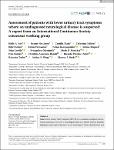Assessment of patients with lower urinary tract symptoms where an undiagnosed neurological disease is suspected: A report from an International Continence Society consensus working group
| dc.contributor.author | Roy, Holly | |
| dc.contributor.author | Nettleton, J | |
| dc.contributor.author | Blain, C | |
| dc.contributor.author | Dalton, C | |
| dc.contributor.author | Farhan, B | |
| dc.contributor.author | Fernandes, A | |
| dc.contributor.author | Georgopoulos, Petros | |
| dc.contributor.author | Klepsch, S | |
| dc.contributor.author | Lavelle, J | |
| dc.contributor.author | Martinelli, E | |
| dc.contributor.author | Panicker, Jalesh | |
| dc.contributor.author | Radoja, I | |
| dc.contributor.author | Rapidi, C | |
| dc.contributor.author | Pereira e Silva, Ricardo | |
| dc.contributor.author | Tudor, K | |
| dc.contributor.author | Wagg, Adrian | |
| dc.contributor.author | Drake, Marcus | |
| dc.date.accessioned | 2023-12-20T11:07:23Z | |
| dc.date.available | 2023-12-20T11:07:23Z | |
| dc.date.issued | 2020-11 | |
| dc.identifier.issn | 0733-2467 | |
| dc.identifier.issn | 1520-6777 | |
| dc.identifier.uri | https://pearl.plymouth.ac.uk/handle/10026.1/21822 | |
| dc.description.abstract |
Aim Lower urinary tract symptoms (LUTS) are a common urological referral, which sometimes can have a neurological basis in a patient with no formally diagnosed neurological disease (“occult neurology”). Early identification and specialist input is needed to avoid bad LUTS outcomes, and to initiate suitable neurological management. Methods The International Continence Society established a neurological working group to consider: Which neurological conditions may include LUTS as an early feature? What diagnostic evaluations should be undertaken in the LUTS clinic? A shortlist of conditions was drawn up by expert consensus and discussed at the annual congress of the International Neurourology Society. A multidisciplinary working group then generated recommendations for identifying clinical features and management. Results The relevant conditions are multiple sclerosis, multiple system atrophy, normal pressure hydrocephalus, early dementia, Parkinsonian syndromes (including early Parkinson's Disease and Multiple System Atrophy) and spinal cord disorders (including spina bifida occulta with tethered cord, and spinal stenosis). In LUTS clinics, the need is to identify additional atypical features; new onset severe LUTS (excluding infection), unusual aspects (eg, enuresis without chronic retention) or “suspicious” symptoms (eg, numbness, weakness, speech disturbance, gait disturbance, memory loss/cognitive impairment, and autonomic symptoms). Where occult neurology is suspected, healthcare professionals need to undertake early appropriate referral; central nervous system imaging booked from LUTS clinic is not recommended. Conclusions Occult neurology is an uncommon underlying cause of LUTS, but it is essential to intervene promptly if suspected, and to establish suitable management pathways. | |
| dc.format.extent | 2535-2543 | |
| dc.format.medium | Print-Electronic | |
| dc.language | en | |
| dc.publisher | Wiley | |
| dc.subject | incontinence | |
| dc.subject | lower urinary tract symptoms | |
| dc.subject | neurology | |
| dc.subject | neurourology | |
| dc.subject | overactive bladder | |
| dc.subject | overactive bladder | |
| dc.title | Assessment of patients with lower urinary tract symptoms where an undiagnosed neurological disease is suspected: A report from an International Continence Society consensus working group | |
| dc.type | Journal Article | |
| plymouth.author-url | https://www.webofscience.com/api/gateway?GWVersion=2&SrcApp=PARTNER_APP&SrcAuth=LinksAMR&KeyUT=WOS:000555343400001&DestLinkType=FullRecord&DestApp=ALL_WOS&UsrCustomerID=11bb513d99f797142bcfeffcc58ea008 | |
| plymouth.issue | 8 | |
| plymouth.volume | 39 | |
| plymouth.publication-status | Published | |
| plymouth.journal | Neurourology and Urodynamics | |
| dc.identifier.doi | 10.1002/nau.24469 | |
| plymouth.organisational-group | |Plymouth | |
| plymouth.organisational-group | |Plymouth|Research Groups | |
| plymouth.organisational-group | |Plymouth|Faculty of Health | |
| plymouth.organisational-group | |Plymouth|REF 2021 Researchers by UoA | |
| plymouth.organisational-group | |Plymouth|Users by role | |
| plymouth.organisational-group | |Plymouth|Users by role|Academics | |
| plymouth.organisational-group | |Plymouth|REF 2021 Researchers by UoA|UoA01 Clinical Medicine | |
| plymouth.organisational-group | |Plymouth|Faculty of Health|Peninsula Medical School | |
| plymouth.organisational-group | |Plymouth|Research Groups|FoH - Applied Parkinson's Research | |
| plymouth.organisational-group | |Plymouth|Users by role|Researchers in ResearchFish submission | |
| plymouth.organisational-group | |Plymouth|REF 2028 Researchers by UoA | |
| plymouth.organisational-group | |Plymouth|REF 2028 Researchers by UoA|UoA01 Clinical Medicine | |
| dc.publisher.place | United States | |
| dcterms.dateAccepted | 2020-07-16 | |
| dc.date.updated | 2023-12-20T11:06:54Z | |
| dc.rights.embargodate | 2023-12-21 | |
| dc.rights.embargodate | 2023-12-21 | |
| dc.identifier.eissn | 1520-6777 | |
| rioxxterms.versionofrecord | 10.1002/nau.24469 |


